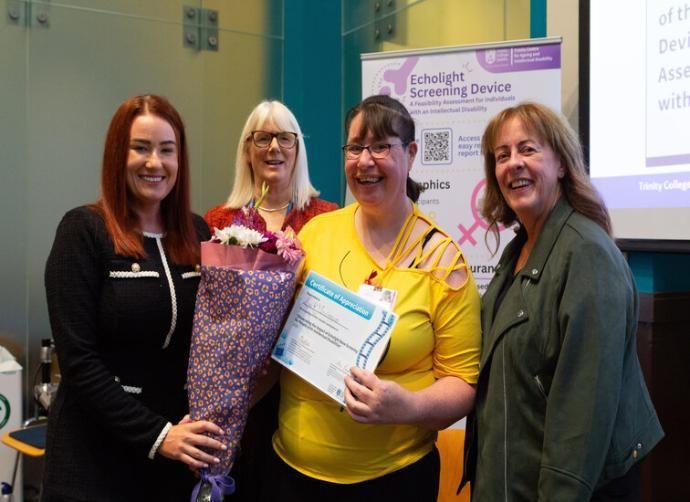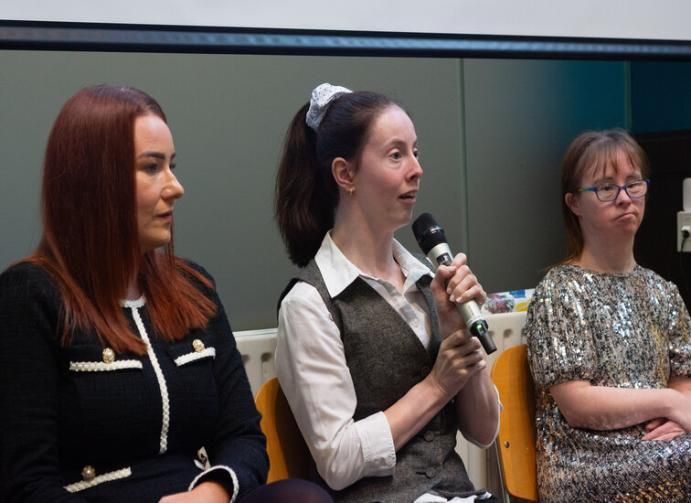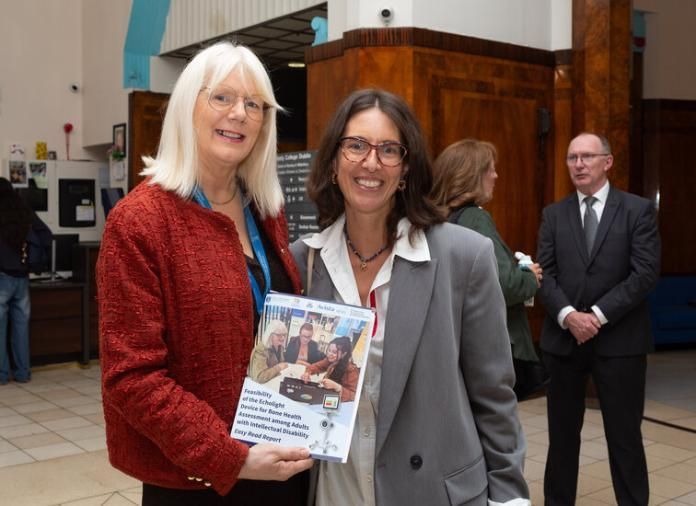Bone health screening game changer for people with intellectual disability
Posted on: 01 October 2025
New research at IDS-TILDA at the School of Nursing and Midwifery has led to improved outcomes for people with intellectual disability who are unable to access a traditional DXA bone scan.
Research conducted by Professor Éilish Burke as part of the Intellectual Disability Supplement to the Irish Longitudinal Study on Ageing (IDS-TILDA) showed that osteoporosis often goes undetected among people with intellectual disability due to extremely low rates of bone health screening. A recent launch of a new IDS-TILDA video which tells the story of this exciting research, along with a panel discussion on the topic took place as part of European Researcher's Night at Trinity College Dublin.

Anne Power, Prof. Éilish Burke, Lisa McGuinness and Michele O'Brien at the launch of the new video from IDS-TILDA on this exciting new research
What is Osteoporosis?
Osteoporosis is an invisible weaking of the structure of the bone which can lead to an increased risk of fracture. Osteoporosis is preventable in most people and early detection through bone health screening is key.
Why does Osteoporosis often go undiagnosed in people with intellectual disability?
People with intellectual disability can have increased risk factors for osteoporosis including sedentary lifestyle, medications such as anticonvulsants, antipsychotics, proton pump inhibitors, poor nutrition, specific syndromes and limited mobility. As a result, they are more likely to develop bone loss at a much younger age than the general population, leading to an increased risk of fractures. Secondary effects of fractures can include loss of independence and premature death.
The gold standard method of screening for bone health is through a DXA scan, however, the DXA machine can present challenges for people with intellectual disability due to a range of physical, communication or behavioural issues such as limited mobility or the person feeling anxious in a hospital setting.
Echolight, a gamechanger for bone health screening for people with intellectual disability
Professor Burke and Anne Power, an Advanced Nurse Practitioner, sought alternatives to the DXA scan and identified Echolight, a Radiofrequency Echographic Multi-Spectrometry (REMs) bone health scanning device which measures bone mineral density. It is a portable device which can facilitate people with intellectual disability to access bone screening in clinics, in the comfort of their own home or in residential facilities.
A feasibility study funded by the Nursing and Midwifery Planning and Development Unit (NMPDU) Southeast found:
- 96% of participants completed the Echolight REMS assessment
- 8% were anxious before the scan
- 100% felt more relaxed and informed after meeting the nurses
- 3% thought the scan was easy to do
Echolight has now been endorsed by the Irish Osteoporosis Society for the diagnosis of osteoporosis in people with intellectual disability.
In 2023 the Health Service Executive funded the purchase of the first Echolight device in Ireland which is now used by Anne to conduct bone health screenings in Wexford Residential Intellectual Disability Services.
 Anne Power, Shannon O'Farrell-Molloy and Kelly Fitzgerald at the launch
Anne Power, Shannon O'Farrell-Molloy and Kelly Fitzgerald at the launch
Anne Power, Advanced Nurse Practitioner and Adjunct Assistant Professor in Intellectual Disability Nursing, said:
“Many doctors rely heavily on DXA scans to guide osteoporosis treatment decisions but this diagnostic is not accessible for people with intellectual disabilities. Echolight offers a promising alternative and has been a gamechanger in helping people with intellectual disability to avail of required bone screening when they cannot access a DXA scan.
Early detection of osteoporosis can help us to prevent further deterioration of the bones and reduce fractures which impact on quality of life.
The integration of Echolight in national health policy could see osteoporosis detection and prevention revolutionised in intellectual disability services around Ireland.”
Michele O'Brien, CEO of the Irish Osteoporosis Society, said:
“The Irish Osteoporosis Society Charity are delighted to have endorsed Echolight specifically for those with intellectual disability, as up until now, there has been no way of screening or monitoring, as DXA scanning was not feasible for most people with intellectual disability.
The results show that this pilot study was a resounding success, which will result long term in significantly improving the quality of life of the most vulnerable in our society. We hope all health professionals who work in this area will consider becoming involved in supporting this project.
Currently Anne is the only person trained to do the screening, however long term there will be opportunities for others to be trained.”
 Prof. Éilish Burke and Dr Luciana Lolich, School of Nursing and Midwifery
Prof. Éilish Burke and Dr Luciana Lolich, School of Nursing and Midwifery
Professor Eilish Burke, Professor in Intellectual Disability Nursing, said:
“An Echolight device has now been integrated within the longitudinal IDS-TILDA study here at Trinity College Dublin which will allow us to conduct more extensive research into bone health across a larger sample of people with intellectual disability in Ireland.
It is increasingly important to study age-related conditions such as osteoporosis in this population, so that we can advance healthcare and enhance quality of life across the lifespan.
We need a mind shift in our thinking when it comes to healthcare for people with intellectual disability. Instead of diagnosing and managing, we need to pre-empt and prevent. Flexible bone health screening enables this.”
WATCH THE NEW VIDEO
The IDS-TILDA team recently hosted the première of a new video which highlights research-led advancements in bone screening for people with intellectual disability in Ireland. You can watch the video to find out more about this exciting new #TrinityResearch at the following link:
SON+M Echolight people with ID video
Media Contact:
Ciara O’Shea | Media Relations | coshea9@tcd.ie | +353 1 896 4204
